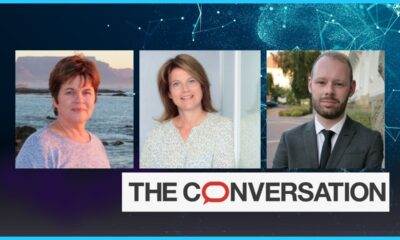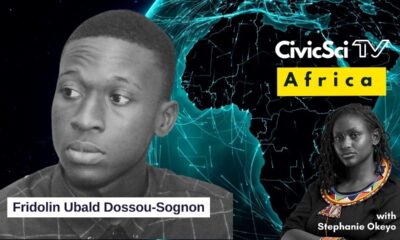Stories in Science Special Series
Should I Stay or Should I Go?
Around half of all Ph.D. students across fields don’t complete their program. I never thought I would be one of them.

Chelsea Weidman Burke
[su_boxbox title=”About”]Chelsea is a biochemist and science writer who is passionate about all things science. She received her B.S. in biochemistry at the Rochester Institute of Technology and her M.S. in chemical biology at Boston College. She is currently a microbiology/immunology laboratory technician & clinical study coordinator, as well as a freelance science writer/editor. Her work has appeared on BioSpace, Harvard University’s Science in the News, and Massive Science. Follow her on Twitter @ChemInquisitive and check out her articles on her blog and in her portfolio.[/su_boxbox]
[su_boxnote note_color=”#d9d8d6″]Key Points
- Changing your career path unexpectedly does not mean you’ve failed – it’s okay to change your mind as you grow and explore.
- Forge your own path – don’t be afraid to depart from the “normal” or “expected.”
- It’s cliché but so true – follow your passion and listen to your gut. [/su_boxnote]
Leaving my Ph.D. program was the hardest – and most rewarding – decision I’ve had to make.
[dropcap]A[/dropcap]s I sat at my desk in the lab, I wrestled with an unhappiness that had built itself a home within me over the past year. “Are these the ‘second year blues’ that everyone talks about?” I wondered. Maybe, but these feelings appeared a mere 7 months after starting my Ph.D. thesis work. “Then why do I feel this way, like something is off, or missing?”
I have always been a planner – making lists, creating schedules, setting goals. My plan had always been so straightforward similar to so many other science majors: graduate with my bachelor’s degree, enter a Ph.D. program immediately afterwards, possibly do a post-doc, then work in industry doing impactful research on a topic I love. I’ve had my life planned out since I was a child – or so I thought.
I found out that you can only plan for what you want to do or be; not how you feel when you get there.
The (not so) unambiguous path
For as long as I can remember, science has fascinated me. I was always asking questions, wondering why things were the way they were, trying to understand and learn as much as I could. I was that kid with her head always in a book – especially huge, nerdy science books. Some of my favorite books to read were the “Handy Answer Books”, large books answering a variety of questions on a certain topic. (My two favorites were “The Handy Bug Answer Book” and “The Handy Weather Answer Book”.)
I had always wanted to be a scientist – never anything else. However, the type of scientist did evolve throughout the years ranging from an entomologist (someone who studies bugs) to a biologist to a chemist. I finally settled on biochemistry, the combination of my two passions.
During undergrad, I did all that I could to gain different science experiences: I started molecular imaging research at the end of my freshman year which I continued until I graduated; I spent my summers at three different internships in three different areas (manufacturing R&D in industry, academic research, and research at a research hospital); and I gave research presentations and presented posters at local conferences.
Throughout my entire time as an undergrad, I knew I was going to pursue a Ph.D.; there was never any doubt or other option in my mind. I also never considered other options because I didn’t think there were many others. Biochemistry majors either went to medical school, graduate school, or went to work in industry (with the assumption that they’d consider graduate school at some point in the future). The path from undergraduate to graduate to either academia or industry was simple and clear-cut, right?
Wrong.
The thought of deviating from the “traditional” scientist career trajectory never even crossed my mind until I was faced with a crossroads in my life – whether or not to leave graduate school.
Unsettling feelings
After beginning grad school, I thought I was right where I wanted to be – until I realized I wasn’t. Despite feeling confident about my lab preparation in undergrad, I suddenly felt very unprepared once I started working in the lab during my second semester. Rather than being drawn to perform experiments and push my project forward, I found myself becoming unmotivated, stressed, and anxious.
Imposter syndrome feelings had seeped into my mind, telling me that I wasn’t doing enough, I wasn’t smart enough, and that I didn’t belong here. I pulled away from benchwork, feeling anxious every time I had to run an experiment because of the fear that something wouldn’t go well. Although failure is a very real part of science (and life), I felt particularly affected.
Then the “second year blues” hit – only that I was barely a second year. I first started feeling unsettled during the summer after my first year – only about 6 months after starting research in the lab.
“Why am I second-guessing myself?” I wondered. “I haven’t had enough time in the lab to be sure of how I feel.”
So, I suppressed any second thoughts for a few months. Right before the start of the fall semester of my second year, I opened up to another student in my lab. She assured me that many people in fact go through the “second year blues”, especially before qualifying examinations near the end of second year. But the timing caught her attention – it was still a bit early to be experiencing these feelings.
Around half of all Ph.D. students across fields don’t complete their program [1].
I never thought I would be one of them.
I continued to push forward, feeling an internal battle rage on. There was a dissonance between what I was doing, what thought I wanted, and how I felt as I was doing it. Maybe I wasn’t on the “right” path after all?
It was still another few months before I legitimately considered what would happen if I left graduate school. What job options would I have? Would I just try again in a different specialty at a different school? I began looking at “alternative” science careers, only to have my eyes opened to a wonderful world full of exciting career options.
As the realization of one door closing came to fruition, another window opened without me realizing it.
Same passion, different outlet
After reevaluating what got me excited, I realized that I was drawn to reading about the latest science breakthroughs in popular science magazines. I enjoyed feeling the exhilaration of scientists pushing the boundary of possibilities forward and learning about fields outside of my own.
I finally put two and two together: “Wait, someone has to write all these fascinating articles that I love reading – maybe I can do that!” Once I realized that I could express my passion for science and learning through writing, I was hooked.
In retrospect, my love for science writing makes complete sense – I’ve always loved reading, learning new things (especially in science), teaching, and writing (although I’ve never consciously thought about it before stumbling upon this new path).
As I talked to people in various science and medical communication fields, I got more and more excited. I could feel myself gravitating towards science writing; like a moth drawn to a porch light at night, I couldn’t get enough.
After doing my fair share of research and informational interviews, I ultimately made the difficult decision to leave graduate school near the end of my second year.
It was almost a year after first experiencing second thoughts when I finally opened up to my advisor about my decision. He was surprised; he had no idea I was seriously considering leaving. However, he helped me critically think about my options, highlighting the utility of a Ph.D. in jobs outside of academia or industry.
Ultimately, I had to make the best choice for me. I didn’t want to close any doors prematurely. So, I decided to move forward with my oral candidacy exam in August right before my third year. I thought I might feel differently after the stress of oral exams were over and I would change my mind; instead, I felt even more sure of my decision to leave.
I passed my oral exams, officially becoming a Ph.D. candidate before writing up my thesis and leaving the program with my master’s degree.
Now over a year later, as I write my story and reflect on that point in my life, I understand that it was the right choice for me. I’m happier, I’m healthier, and I’m enjoying life. But I wouldn’t change a thing – my time in my Ph.D. program was extremely valuable, teaching me not only career-related skills, but allowing me to discover exactly what was important to me in my career.
I’m so glad I listened to my gut and made the scariest decision I’ve made so far – taking a huge risk to rewrite my career path, throw away my plans, and build new ones as I go. While I’m still unsure of exactly how my story as a scientist (and now writer) will unfold, I sure am excited to be along for the adventure.
Cover Image provided by Chelsea W. Burke (credit: Rochester Institute of Technology “Imagine RIT 2016 Commercial“).
References
Metrics
Sessions
Total number of Sessions. A session is the period time a user is actively engaged with the page.
Visitors
Users that have had at least one session within the selected date range. Includes both new and returning users.
Page views
Pageviews is the total number of time the article was viewed. Repeated views are counted.
The CS Media Lab is a Boston-anchored civic science news collective with local, national and global coverage on TV, digital print, and radio through CivicSciTV, CivicSciTimes, and CivicSciRadio. Programs include Questions of the Day, Changemakers, QuickTake, Consider This Next, Stories in Science, Sai Resident Collective and more.

-
 Audio Studio1 month ago
Audio Studio1 month ago“Reading it opened up a whole new world.” Kim Steele on building her company ‘Documentaries Don’t Work’
-
Civic Science Observer1 week ago
‘Science policy’ Google searches spiked in 2025. What does that mean?
-
Civic Science Observer1 month ago
Our developing civic science photojournalism experiment: Photos from 2025
-
Civic Science Observer1 month ago
Together again: Day 1 of the 2025 ASTC conference in black and white
Contact
Menu
Designed with WordPress
























